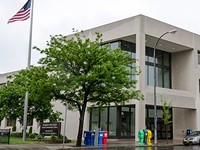[
{
"name": "500x250 Ad",
"insertPoint": "5",
"component": "15667920",
"parentWrapperClass": "",
"requiredCountToDisplay": "1"
}
]
It's probably not a surprise to you, but here's some news: Americans have turned our back on school integration.
Actually, we turned our back on it a long time ago. This month's Supreme Court decision on affirmative action policies in Michigan is just the latest evidence.
Affirmative action has helped innumerable minority students get a college education. And universities that have abandoned affirmative action have seen a decline in minority enrollment.
Universities have argued, correctly, that in addition to helping minority students, the diversity that affirmative action provides serves a broader public interest. But much of the country, including the Supreme Court's majority, has decided that we don't need affirmative action any more. And so colleges and universities are becoming more segregated, mimicking what has already happened in the lower grades.
And there, the situation is unconscionable. Across the nation, segregated school districts are the norm. Particularly in metropolitan areas like Rochester, most students in suburban schools are white, and children in urban schools are predominantly African-American and Hispanic. And most of them are poor.
The result: hundreds of thousands of African-American and Hispanic children are getting a very limited education, which will result in a severely limited future. That's a clear violation of their rights. And it spells big trouble for the United States.
There is abundant evidence that it isn't the schools or the teachers or the principals that are the problem. It's concentrated poverty, which creates challenges that are almost impossible for schools to overcome. To accept that evidence, though, would mean integrating our schools, and we're not about to do that. And so across the country, state governments, urban school districts, mayors, charter school operators, and business and civic leaders are cheering on a host of experiments.
Standardized tests, tougher standards, public school choice, charter schools, longer school days.... By god, we'll prove that we can give children a good education without integrating the schools. And off we run after the latest trend.
The big education news a few weeks ago: New York State has the most segregated schools in the entire country. And who in New York has some of the most-segregated schools?
Yes, indeed: Rochester, whose habitually beleaguered school district has followed every conceivable trend. And whose graduation rates, test scores, poverty rate, and racial segregation have gotten worse and worse.
There are individual success stories, to be sure. Some Rochester children excel. Some of our multiple experiments – in traditional public schools and in charters – will succeed.
But those examples will remain in the minority. There is indisputable evidence that nothing will change on a broad scale until we break up the concentration of poverty in the schools children attend.
Right now, every child attending a traditional Rochester public school attends a school where most children are poor. Every single one.
The lowest poverty rate among the elementary schools is at School 23 in the Park Avenue area. That's a mostly affluent, mostly white neighborhood. But School 23's student population is 34 percent white, and 62 percent poor. The poverty rate in most Rochester elementary schools is in the 80's or 90's – and at School 9 on North Clinton Avenue, the rate is a pure 100 percent.
Among the high schools, the lowest-poverty schools are School of the Arts (66 percent poverty) and Wilson Magnet (79 percent). All the others are in the 80's and 90's, with Monroe at the top (94).
If you believe that concentrated poverty doesn't doom a school district and its children, I guess you figure statistics like that are irrelevant. But if you believe that to give Rochester's children the education they deserve, we have to break up the concentration of poverty, it's hard to have any hope.
Those numbers are hard facts. Giving all Rochester children a good education can't be done within the city alone. We'll have to integrate city and suburban students. And almost nobody is willing to do that.
School integration, after all, was a remedy for the 1950's.
In the South.
Speaking of...
-

Urban Action 8/14
Aug 14, 2019 -

In the RCSD-city fight, the children are losing
Jul 30, 2019 -

There's no one 'fix' for the RCSD's problems
Jun 18, 2019 - More »
Latest in Urban Journal
More by Mary Anna Towler
-

Police reform: advocates on what should come next
Oct 22, 2019 -

Court clears the way for Police Accountability referendum
Oct 17, 2019 -

Dade outlines initial actions on district deficit
Oct 9, 2019 - More »






